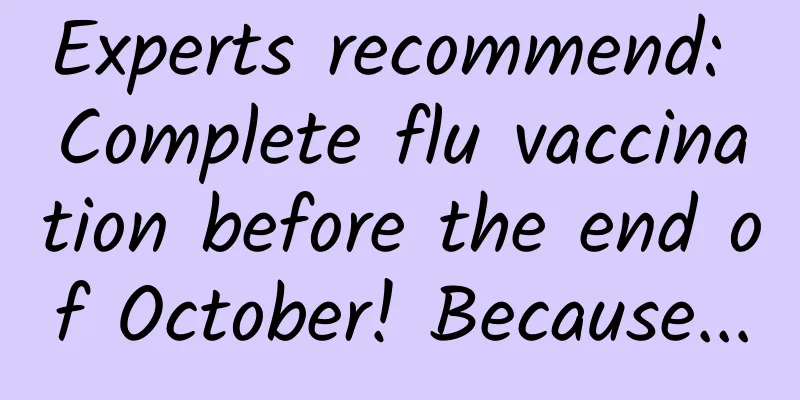Experts recommend: Complete flu vaccination before the end of October! Because...

|
On September 6, 2024, at the press conference on "Seasonal Terms and Health" held by the National Health Commission, Wang Huaqing, chief expert of the immunization program of the Chinese Center for Disease Control and Prevention, recommended that influenza vaccination should be completed before the end of October . But what is different this year is that a new flu vaccine was approved as early as April this year, and the vaccination time was significantly earlier than in previous years. So when should we get the flu vaccine this year? What are the effects of getting it early or late? How to choose a flu vaccine? Let's find out together. Flu vaccination is required every year Influenza (abbreviated as "flu") is an acute respiratory infectious disease caused by influenza virus that poses a serious threat to human health. Its pathogen, influenza virus, belongs to the Orthomyxoviridae family and is a single-stranded, negative-stranded, segmented RNA virus that is highly contagious and variable. Influenza virus, source: CDC PHIL The World Health Organization estimates that influenza causes 1 billion infections, 3 million to 5 million severe illnesses, and 290,000 to 650,000 respiratory disease-related deaths each year worldwide. If divided by population, 5% to 10% of adults and 20% to 30% of children worldwide will be infected with influenza each year. Not only that, because influenza viruses are prone to mutation, the influenza strains may change every year, making it difficult for antibodies previously formed through natural infection or immunization to effectively neutralize the mutated viruses, so people are generally susceptible to influenza. Getting a flu vaccine every year is an effective way to prevent the flu. In order to cope with the ever-changing flu virus, the World Health Organization (WHO) updates the vaccine components every year based on the virus mutations (it may not be updated in some years), and vaccine manufacturers will also use the latest strains provided by WHO to prepare flu vaccines. Screenshot of the World Health Organization's influenza vaccine composition recommendations page Therefore, in order to obtain targeted and adequate protection, new influenza vaccines prepared with the strains recommended by the WHO in that year (usually February in the northern hemisphere) should be administered every year. Why is it recommended to do so before the end of October? Completed vaccination? The positive detection rate of influenza virus in our country fluctuates with the seasons , so it is very important to choose the right time to get the influenza vaccine . In the past, most of the winter and spring influenza epidemic seasons in my country began in December, peaked in January, and then declined and lasted until March. According to the weekly distribution data of influenza virus positive detection rate in my country from 2014 to 2018, the influenza virus positive detection rate was the highest in winter (week 50 to week 11 of the following year), followed by summer (week 23 to week 38), spring (week 12 to week 22) and autumn (week 39 to week 48). Weekly distribution of influenza virus positive detection rate in China from 2014 to 2018 Some people may ask: Didn’t previous non-drug intervention measures affect the epidemic trend of influenza to a certain extent? In fact, the COVID-19 pandemic has had a certain impact on influenza activity in recent years, but it has now begun to gradually return to normal seasonal patterns and intensity, so it is still sufficient to follow previous vaccination recommendations. That is to say, it is a more appropriate time to get a flu shot before winter arrives. Vaccination should not be too early or too late Of course, "before the end of October" is a very broad concept, so which specific month is the most appropriate to get the flu vaccine? China's "Technical Guidelines for Influenza Vaccine Immunization" points out that the time and duration of peak influenza activity vary from place to place each year . To ensure that recipients are immune protected before the peak influenza season, it is recommended that all places arrange vaccination as soon as the vaccine becomes available, and it is best to complete the vaccination before the local influenza epidemic season. Copyright images in the gallery. Reprinting and using them may lead to copyright disputes. The recommendations of the U.S. Centers for Disease Control and Prevention (CDC) state that for most people who need 1 dose of influenza vaccine (that is, people aged ≥9 years or children aged 6 months to 8 years who have received ≥2 doses), the ideal vaccination time is September or October . In addition, the CDC recommends that these groups get a flu shot in July or August : 1. Adults and women in early or mid-pregnancy who are worried about not being able to receive influenza vaccine in the future ; 2. Children aged 6 months to 8 years need 2 doses of influenza vaccine ; 3. School-age children who only need one dose of vaccination and must complete the vaccination before school entry ; 4. Women in late pregnancy who are worried about not being able to get the flu vaccine in September or October . Why should we get the flu vaccine in September or October, but not earlier or too late, except in special circumstances? The reason is simple: the effect is reduced or the protection is not timely. Vaccination is available in September and October Research has found that although the risk of getting the flu is reduced after receiving the flu vaccine, over time, the monthly chance of getting the flu increases by 9% to 28% for the entire population, and by 12% to 29% for people aged 65 and above. In other words, if you get vaccinated too early, your immunity may not be ideal before the epidemic season arrives . Although delaying vaccination will theoretically result in stronger immunity during the epidemic season, the peak influenza season is not the same every year. In addition, delaying vaccination may result in missing the influenza vaccination due to vaccine supply, vaccination services and other reasons. Therefore, now (September) is a very suitable time for influenza vaccination, and it is recommended to complete the vaccination before the end of October . If the vaccination is still not completed after October, the influenza vaccine should be received as soon as possible. Frequently Asked Questions and Answers: 1.Who is recommended to get the flu vaccine? Everyone. Routine annual influenza vaccination should be given to all people aged ≥ 6 months who do not have contraindications, especially those at increased risk for severe illness and complications of influenza (see figure below) and health care workers who may be exposed to patients with influenza. 2.What is the immunization procedure for influenza vaccine? According to the actual situation. The immunization procedures in my country's "Technical Guidelines for Influenza Vaccine Immunization in China" and the vaccine instructions are different (see the figure below). Generally speaking, children aged 6 months to 8 years old are given 1 or 2 injections, and people aged ≥ 9 years old are given 1 injection every year. In actual implementation, the requirements of the vaccination unit shall prevail. 3. Which influenza vaccine is recommended first? No priority recommendation. Both the Chinese and US Centers for Disease Control and Prevention have clearly stated that when multiple influenza vaccines are available, no priority recommendation will be made for any influenza vaccine. The influenza vaccines used in my country are all prepared based on chicken embryos, and there is currently no clear evidence that any domestic influenza vaccine produced using any existing process has a better protective effect against influenza morbidity, hospitalization, or even death. 4. Can people with egg allergy get the flu vaccine? Yes. Although the instructions (both guidelines and pharmacopoeias have deleted) may list egg allergy as a contraindication, professional organizations at home and abroad still recommend that all people aged 6 months or older with egg allergy receive influenza vaccination. Interestingly, overseas retrospective studies have found that no anaphylactic shock or severe allergic reactions were found in people with egg allergy who received influenza vaccines based on chicken embryos, but relevant institutions have recorded severe allergic reactions after vaccination with recombinant influenza vaccines that were not prepared from chicken embryos (not available in China). 5. Can the flu vaccine be administered at the same time as other vaccines? It can be administered at the same time as many vaccines. According to the guidelines of my country, inactivated influenza virus vaccines (including split vaccines and subunit vaccines) can be administered at the same time as other inactivated vaccines and live attenuated vaccines, such as EV71 vaccine, pneumococcal vaccine, herpes zoster vaccine, varicella vaccine, measles, mumps and rubella vaccine, diphtheria, pertussis and tetanus vaccine, etc., and can be administered at different sites at the same time. In addition, considering the higher risk of respiratory diseases in the elderly, the guidelines specifically recommend that elderly people aged 60 years or older who have not been vaccinated with the 23-valent pneumococcal polysaccharide vaccine before the flu season arrives, or elderly people aged 65 years or older who have had an interval of more than 5 years since the last dose of 23-valent pneumococcal polysaccharide vaccine. 6. How to prevent influenza if you cannot get the flu vaccine? Use pharmacologic prophylaxis as appropriate. For people who cannot be vaccinated, particularly those at higher risk for medical complications from severe influenza, prophylactic use of antiviral medications to prevent influenza may be considered. References [1]Krammer F, Smith GJD, Fouchier RAM, et al. Influenza[J]. Nat Rev Dis Primers, 2018, 4(1): 3. doi: 10.1038/s41572-018-0002-y. doi:10.1038/s41572-018-0002-y ↑ [2]Vaccines against influenza WHO position paper – November 2012[J]. Wkly Epidemiol Rec, 2012, 87(47): 461-476. ↑ [3]World Health Organization. WHO recommendations on influenza vaccines[EB/OL]. [2024-09-18]. https://www.who.int/teams/global-influenza-programme/vaccines/who-recommendations. ↑ [4]Zhu AQ, Li ZJ, Zhang HJ. Spatial timing of circulating seasonal influenza A and B viruses in China from 2014 to 2018[J]. Sci Rep, 2023, 13(1): 7149. doi: 10.1038/s41598-023-33726-7. ↑ [5] Yiran Xie, Shuxia Lin, Xiaoxu Zeng, Jing Tang, Yanhui Cheng, Weijuan Huang, Jiandong Li, Dayan Wang. Two Peaks of Seasonal Influenza Epidemics — China, 2023[J]. China CDC Weekly, 2024, 6(36): 905-910. doi: 10.46234/ccdcw2024.069 ↑ [6] Technical Guidelines for Influenza Vaccination in China (2023-2024)[J]. Chinese Journal of Viral Diseases, 2024, 14(01): 1-19. DOI: 10.16505/j.2095-0136.2024.1001. ↑ [7]Grohskopf LA, Ferdinands JM, Blanton LH, Broder KR, Loehr J. Prevention and Control of Seasonal Influenza with Vaccines: Recommendations of the Advisory Committee on Immunization Practices — United States, 2024–25 Influenza Season[J]. MMWR Recomm Rep, 2024, 73(No. RR-5): 1-25. doi: http://dx.doi.org/10.15585/mmwr.rr7305a1. ↑ Planning and production Author: Shao Yinan, popular science creator Review丨Zhu Ling, deputy chief physician of Chongqing Nan'an District Center for Disease Control and Prevention Planning丨Yinuo Editor: Yinuo Proofread by Xu Lailinlin Related Recommendations The cover image and the images in this article are from the copyright library Reprinting may lead to copyright disputes |
<<: World Alzheimer's Day | How to effectively meet the challenges of dementia?
>>: A holy place for stargazing in the dark night: How “hardcore” is Mount Lemmon Observatory?
Recommend
Introduction and principle analysis of iOS automated testing framework Kiwi
This article is reprinted from the WeChat public ...
Volvo recalls 74,000 vehicles in the US, including the S90
According to foreign media reports, Volvo will re...
In fact, choosing competing products is not that simple!
I don’t know since when the word “competitor” has...
How to go from "white soil" to "oasis"? Let's see the "salty confession" of the earth
In ancient my country, people have already realiz...
How to operate a product in Jianshu
1. Product positioning Jianshu is a product that ...
These are the scariest animal sounds on Earth, and you probably hear them all the time
Lions, tigers, bears, when these animals roar, th...
The effects and functions of mutton, the effects and functions of mutton soup!
The effects and functions of mutton: It is hot in...
Case studies of Mayu maternal and child care and parent-child education industry
In order to know what kind of industry advertisem...
The four magic weapons for good APP promotion: armor, weapons, martial arts, and war horses
1. What is Internet Promotion? Promoters use the ...
How much does it cost to develop the Wuhu movie mini program? Wuhu movie applet development price inquiry
More and more businesses are paying attention to ...
How to do live streaming sales from 0 to 1
In 2016, live streaming e-commerce entered the pu...
What happened with Meituan’s response to the cancellation of Alipay payment? Why did Meituan cancel Alipay payment?
What happened with Meituan’s response to the canc...
The 13th and 14th Guike Xianyu Project Practice Classes will teach you how to play Xianyu easily, using multiple channels and methods to divert traffic to private domain traffic pools
The 13th and 14th Guike Xianyu Project Practice C...
China Passenger Car Association: Tesla's sales in May were 33,463 vehicles, a year-on-year increase of 202%
On June 9, 2021, according to the China Passenger...









